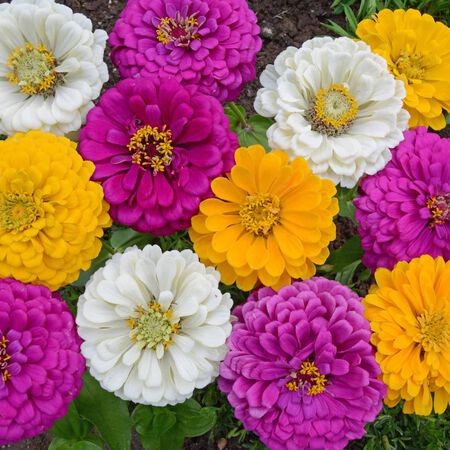Mardi Gras, Zinnia Seeds
Key Attributes
Key Attributes
Product Details
Weight
0.01Depth
0.15Height
4.5Width
3.25Plant Height
2-4'Botanical Name
Zinnia elegansSeed Type
SeedAdditional Characteristics
Attracts PollinatorsSeeds Per Gram
138Seeds Per Pound
62,500Packet
100 SeedsSow Depth
1/4"Seeds Per Ounce
3,906Breed
Open-pollinatedSun
Full SunUses
Cut FlowersLife Cycle
AnnualSow Method
Direct Sow,TransplantCategories
FlowersDays To Maturity (# Days)
80Seeds Per Acre
19 lbsComponents
Growing Instructions
![]() Learning Download: How to Grow Zinnias
Learning Download: How to Grow Zinnias
Zinnias are a popular flower and add a beautiful burst of color to a bouquet. Zinnias grow in many different colors and shapes and can bloom with flowers up to 6 inches in diameter.
Before Planting: Zinnias are a warm-weather flower, but they don’t like to be transplanted. Plant them directly outdoors when air and soil are 70 degrees or warmer.
Planting: Plant seeds 1/4 inch deep and space them depending on how you want them to grow in the garden.
Watering: Water Zinnias an inch a week, but make sure you don’t overwater because Zinnias are susceptible to mildew. When watering, water at the base of the plant and don’t get water on the leaves or stems.
Fertilizer: Work compost into the ground where you will be planting Zinnias early in the season so the compost has time to fertilize the soil.
Days to Maturity: Zinnias will begin to bloom in 60-70 days after being planted.
Harvesting: To use in a bouquet, cut the Zinnias above the leaves and place in a vase. More Zinnias will bloom on the stem.
Tips: To produce bushier Zinnias, pinch off the top of the plants when they are young.
Shipping Schedule
Our Seed Promise
 "Agriculture and seeds" provide the basis upon which our lives depend. We must protect this foundation as a safe and genetically stable source for future generations. For the benefit of all farmers, gardeners and consumers who want an alternative, we pledge that we do not knowingly buy or sell genetically engineered seeds or plants.
"Agriculture and seeds" provide the basis upon which our lives depend. We must protect this foundation as a safe and genetically stable source for future generations. For the benefit of all farmers, gardeners and consumers who want an alternative, we pledge that we do not knowingly buy or sell genetically engineered seeds or plants.
The mechanical transfer of genetic material outside of natural reproductive methods and between genera, families or kingdoms, poses great biological risks as well as economic, political, and cultural threats. We feel that genetically engineered varieties have been insufficiently tested prior to public release. More research and testing is necessary to further assess the potential risks of genetically engineered seeds. Further, we wish to support agricultural progress that leads to healthier soils, to genetically diverse agricultural ecosystems, and ultimately to healthy people and communities.
To learn more about the "Safe Seed Pledge" please visit www.councilforresponsiblegenetics.org.

